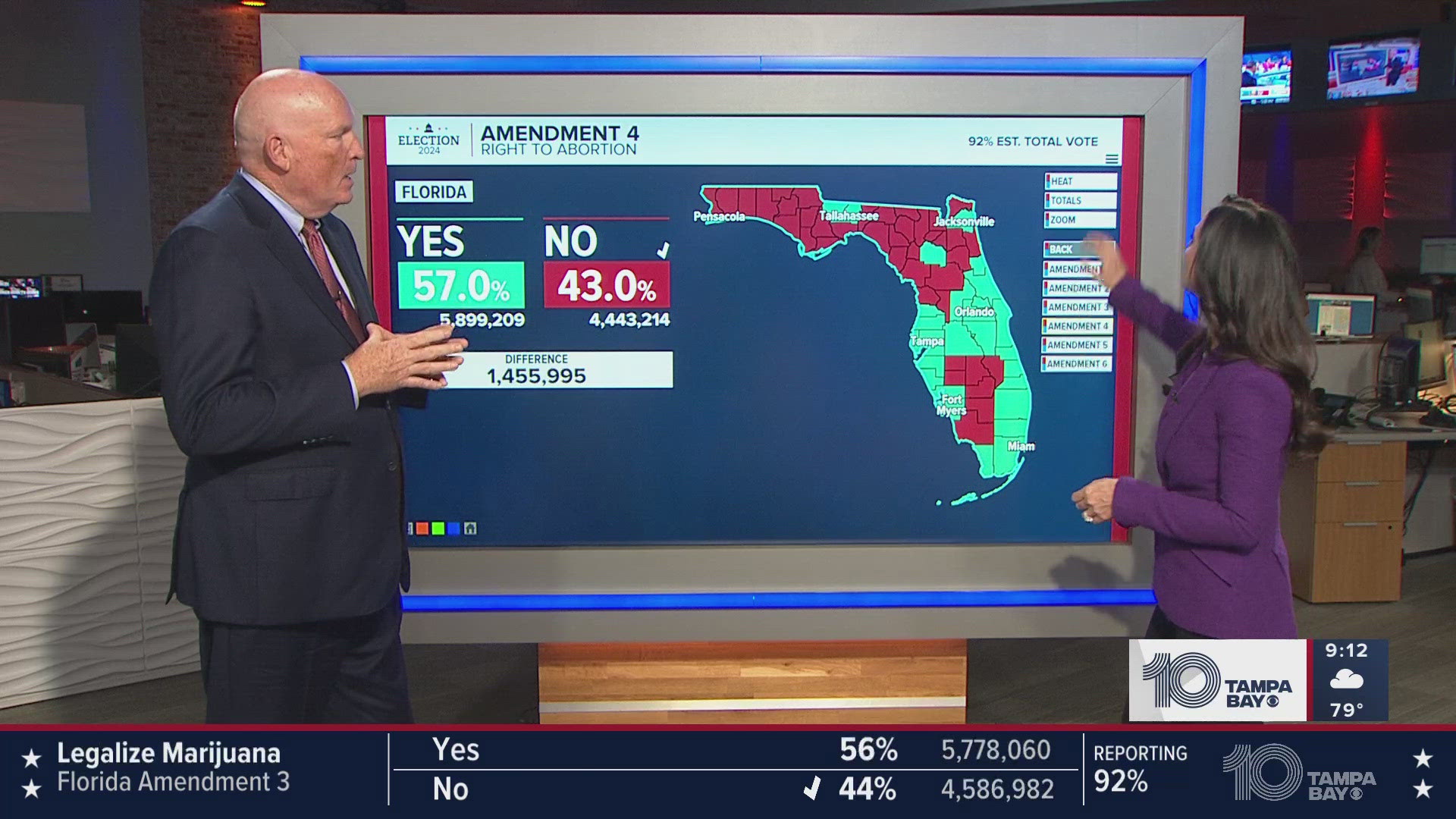FLORIDA, USA — Voters throughout the nation are beginning to receive the results for Election Day 2024, including the projected winners in state, local and federal races — as well as amendment results.
Six amendments were on the ballot in Florida, though two of those garnered the most attention: Amendment 3, the recreational marijuana measure, and Amendment 4, the abortion rights measure.
Here are the results for the amendment results in Florida, and what each result means for the state.
Amendment 1-Fail
Amendment 1 failed to gain approval from Florida voters, meaning political party affiliations will stay out of school board races.
The constitutional amendment failed to receive 60% of the vote as required, instead receiving 55%, according to election results from the Associated Press.
The amendment would have forced all future school board candidates to declare a political party in order to run. Because Amendment 1 failed, school board races will remain non-partisan and voters registered as “no party affiliation” will be able to continue participating in the elections.
Amendment 2-Pass
According to preliminary results from the Associated Press, Amendment 2 is projected to pass in Florida, meaning hunting and fishing rights are expected to be put in the state constitution.
The amendment summary, the wording that appeared on the ballot, says, in part, that the measure would “preserve forever fishing and hunting, including by the use of traditional methods, as a public right and preferred means of responsibly managing and controlling fish and wildlife.”
Amendment 3-Fail
Amendment 3, Florida’s recreational marijuana measure, is projected to fail.
In order to pass Amendment 3, 60% of Floridians needed to vote "yes." However, only 55.7% voted "yes," according to the Associated Press. That means recreational marijuana will remain illegal under Florida law.
If Amendment 3 had passed, Floridians ages 21 would have been able to legally possess up to 3 ounces of marijuana and up to 5 grams of marijuana in concentrate form for recreational use.
Amendment 4-Fail
According to preliminary results from the Associated Press, Amendment 4 has failed to get approval from Florida voters, meaning the state’s current 6-week abortion ban will remain in place.
According to the AP election results, 57% of Floridians voted “yes" on the measure. It needed 60% of votes to pass.
If it had passed, Amendment 4 would have enshrined the right to an abortion in Florida’s constitution. It would also have blocked Florida lawmakers from restricting abortions before the point of viability — usually around 24 weeks of pregnancy.
Amendment 5-Pass
The Associated Press has projected Amendment 5 to pass in Florida. It proposes an annual adjustment for inflation to the value of current or future homestead exemptions that applies solely to levies other than school district levies and for people with legal or equitable title to real estate, maintain permanent residence on the real estate or are legally or naturally dependent on the owner.
The amendment, which is sponsored by the Florida legislature, is set to take effect Jan. 1, 2025. It would create an addition to Section 6 of Article 7 of the Florida Constitution that deals with homestead exemptions.
Currently, homeowners in the state of Florida are allowed to exclude $25,000 of their home's assessed value for tax purposes. Amendment 5 will adjust that $25,000 based on inflation according to the consumer price index.
However, that will not apply to school taxes. The state's Revenue Estimating Conference predicts that upon Amendment 5 passing, it would slightly reduce local government property taxes.
Amendment 6-Fail
The Associated Press has projected that Amendment 6 has failed to garner enough votes to pass in Florida. It needed 60% of voter approval to pass.
The text of Amendment 6 had proposed to repeal the provision in the state constitution which requires public financing for campaigns of candidates for statewide office who agree to campaign spending limits.
Current public campaign financing is available for candidates for governor, lieutenant governor, attorney general, chief financial officer and agricultural commission who have already raised at least $100,000 themselves.
If it passed, Amendment 6 would have repealed a campaign finance law that was approved by voters in 1998. A similar amendment to repeal that law was proposed in 2010 but failed to receive the required number of votes.

